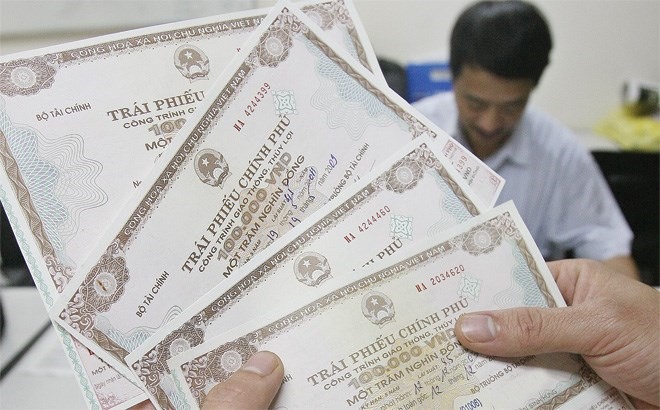A total of VND104.2 trillion (US$4.46 billion) has been raised this year as of August 22 by the State Treasury of Vietnam via auctions of Government bonds at the Hanoi Stock Exchange.

A total of VND104.2 trillion (US$4.46 billion) has been raised this year as of August 22 by the State Treasury of Viet Nam via auctions of Government bonds at the Ha Noi Stock Exchange.
At an auction last week, the State Treasury mobilised VND4.1 trillion worth of 10-year and 15-year Government bonds.
Bonds with 10-year maturity raised VND1.5 trillion with annual interest rate of 4.6 per cent, up 0.03 per cent from the previous auction on August 15.
A sub-session auction of 10-year bonds drew VND600 billion with yearly interest rate of 4.6 per cent. Those with a 15-year term attracted VND1.4 trillion with an annual interest rate of 4.87 per cent, up 0.03 per cent in comparison with the rate of the previous auction.
As much as VND600 billion was mobilised from 15-year bonds at the sub-session auction with an interest rate of 4.87 per cent per year.
No bonds of five-year, seven-year and 30-year terms were sold at this auction.
Last year,
Speaking to the media last week, Phan Thi Thu Hien, head of the Ministry of Finance’s Finance-Banking Department, said efforts of the ministry to restructure the Government bond market had turned the bonds into an important capital mobilisation channel for national economic development.
Hien said that before 2015, despite the ministry’s efforts in building a legal framework for G-bond market development, it faced many problems, including the small scale of the market (accounting for only 13.84 per cent of GDP in 2014), the dominance of commercial banks in the market and bonds’ short terms.
To tackle the issue, the Government directed the MoF to apply measures to reform the market and restructure public debt, lengthening the G-bond terms and diversifying investors.
As of July 2018, commercial banks owned 51.1 per cent of G-bonds, much lower than the ratio of 79.7 per cent in 2014. Other investors included Viet Nam Social Security, insurance companies and foreign investors.
G-bond terms have been expanded to 5-30 years. The diversity helped increase the scale of the secondary market to about VND9 trillion per session in 2017, much higher than VND1-2 trillion per session in 2011-13. In the first seven months of 2018, the average value of each transaction session was VND10.4 trillion per session, noted Hien.
Meanwhile, the ministry has focused on building and completing the legal framework as a foundation for the formation and development of long-term investors, creating sustainable demand for the market, targeting voluntary pension funds, insurance companies and foreign investors, said Hien, highlighting that the G-bond market no longer depends on banks.
Comparing the G-bond markets in Viet Nam and other regional countries, Hien said the scale of the Vietnamese market is still modest and has yet to hit its potential.
As of July this year, the outstanding balance of the domestic bond market was 39.9 per cent of 2017’s GDP, while that of the G-bond market was 29.2 per cent.
Looking outside, the scale of the bond market of
In terms of liquidity, the average value of each transaction session in Viet Nam is similar to
Hien said the reason for this was the small scale of the domestic market due to lower economic development level, and the limited role of the secondary market, as well as the old technology infrastructure system.
In the future, it is necessary to develop new products in the bond market, better operate the derivative stock market and apply measures to increase liquidity of the market and improve transaction value.
Hien revealed that in 2019, the MoF will concentrate on developing market makers bearing full rights and obligations in accordance with international practice, while expanding investors by asking Viet Nam Social Security to get involved more deeply in G-bond trading, luring more long-term and foreign investors and developing more voluntary pension funds and products. — VNS





